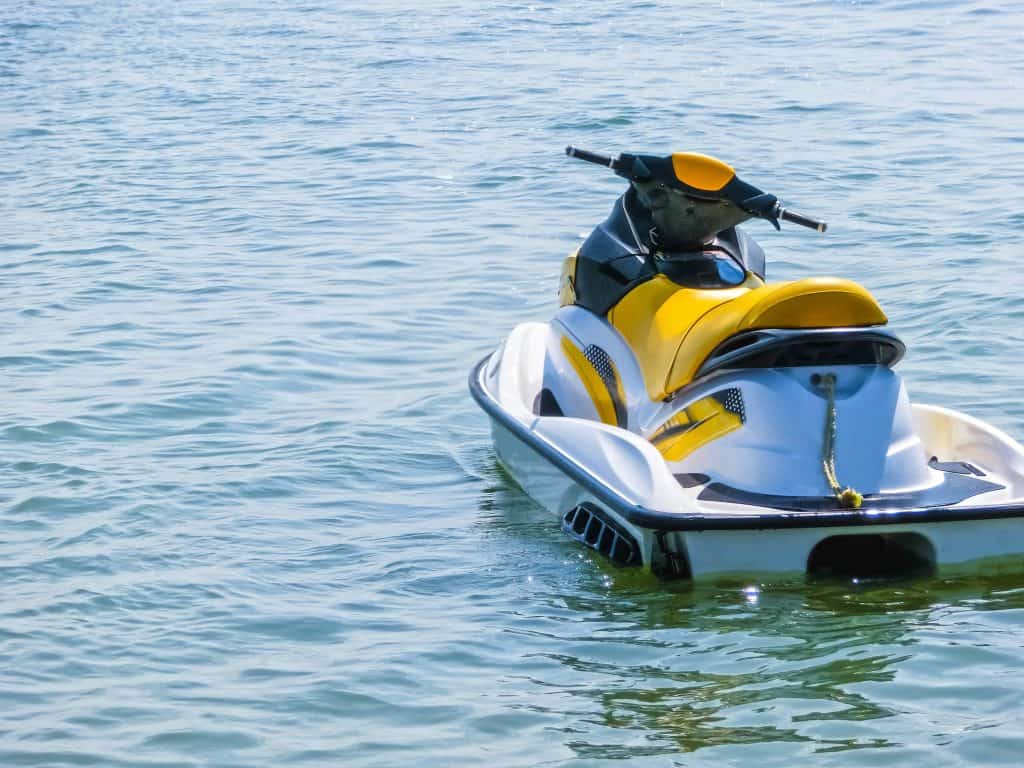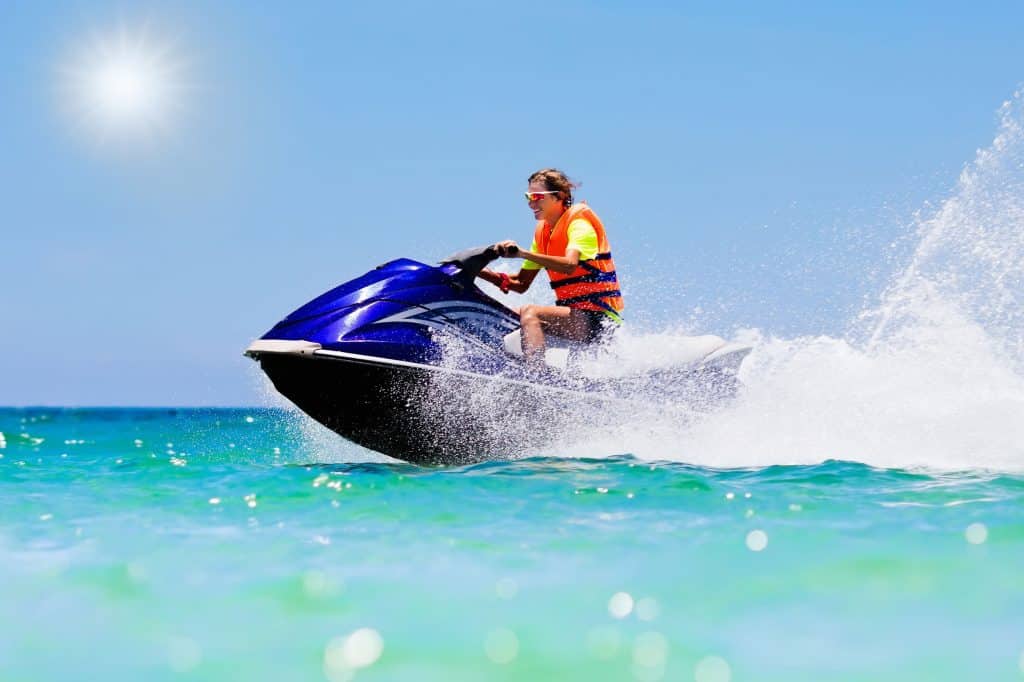
Jet skis are a great way to spend time on the water in the summertime and create some memorable times with family and friends. Though jet ski laws can vary from state to state and it is a need-to-know in order to be able to enjoy your time on the water.
There are many rules and regulations to properly and lawfully use a jet ski on the water in the state of Pennsylvania. One of the most important being anyone operating a jet ski must own a Boating Safety Education Certificate and anyone 15 years of age or younger are not allowed to operate a jet ski.
The Basics
Jet skiing is a fun and adventurous way to pass the time in the summertime. Although it may seem that you simply need to put your jet ski onto the water and jump right into having fun that is not the case. You will the proper documentation in order to legally take your jet ski out on the water.
Registration
The Pennsylvania Fish & Boat Commission (PFBC) is responsible for regulating the state boating laws in Pennsylvania.
All vessels propelled by machinery, including gasoline, diesel, and electric motors, and principally operated on Pennsylvania waters must be registered and issued a Pennsylvania Boat Registration Card by the PFBC. Documented recreational vessels such as yachts also need to be registered as well as sailboats that use gasoline, diesel or electric motors for auxiliary power.
Certificate of Registration
Boat owners must own a 60-day temporary Certificate of Boat Registration before they can go on to use their watercraft vehicle. Upon receiving the Certificate of Boat Registration please be sure to know of the following:
- The certificate must be signed and you must carry it onboard when operating using the jet ski or PWC.
- It is valid for two years and expires on March 31st of the second year.
- If the residency of the boater changes you must notify the PFBC of the change in order to avoid any charges.
- You must also notify the PFBC in five days if the boat turns up stolen, sold, destroyed or recovered.
Boating and Alcohol
A boater with a blood alcohol content of 0.08% or more will be guilty of boating under the influence of alcohol (BUI).
Boating under the influence is a serious offense in the state of Pennsylvania and can punishable by up to two years in prison, and you will then lose your privilege of boating for one year. Your charge will also include a fine of $7,500.
Waterways Conservation Officers have the authority and power to stop and test a vessel operator if they feel they have enough reason to do so.
“Zero Tolerance” prohibits persons younger than 21 years of age from consuming alcohol and operating a vessel with any measurable alcohol level above 0.02%
Pennsylvania Boating Laws
| Code Sections | – Certificate of Title Require – Registration of Motorboats Required – Boating Education Required – Chemical Testing to Determine the Amount of Alcohol or Controlled Substance -Operating Watercraft Under the Influence of Alcohol or Controlled Substance – Accident Reports |
| Age Requirement | Within the state of Pennsylvania, anyone who is born on or after January 1st, 1982 must have a certificate that states they are fit to operate a motorboat. Those that fall within these reasons are exempt from the requirement stated above: – Anyone who is from out of state or visiting for 60 days or less – Anyone visiting from outside the country for 90 days or less – A landowner or anyone in their immediate family who is operating a motorboat on private waters owned by them – One operating a motorboat powered through an electric motor or engine with 25 horsepower or less. |
| Boating While Under the Influence | – One can be found guilty of boating under the influence if they have 0.08 percent or higher blood alcohol content, more than one of the controlled substances. |
| Accidents While Boating | If an accident occurs you must file a written report: – Within 48 hours of the accident occurrence, where a person needs more medical treatment than simple first aid, or if a person disappears or dies. – Within 10 days if an earlier report is not required. |
Registering Your Jet Ski in Pennsylvania
In order to successfully register your boat or PWC in the state of Pennsylvania, your boat must have physical boat numbers and a decal visibly placed onto it. Your boat numbers must follow the following criteria below:
- They must be at least 3 inches high
- They must be easily observed and as vertical as possible
- They must contrast the color of the boat itself
- They have to be bold, block letters that are of good proportion
- They must be painted or at least applied permanently to each side on the vessel where no other number is near it
| Registration Item | Fee |
| Unpowered Boats | $18 |
| Boats less than 16 feet | $26 |
| Boats 16 feet to less than 20 feet | $39 |
| Boats 20 feet and greater | $52 |
| Duplicate title with changes | $30 |
| Tilting Fee | Fee |
| Certificate of Title (new or corrected) | $15 |
| Duplicate | $5 |
| Lein Recording | $5 |
| Other | Fee |
| Capacity Plate | $5 |
Personal Watercraft Rules & Regulations

First and foremost PWCs (Personal Watercrafts) can ONLY be operated between the hours of sunrise and sunset in the state of Pennsylvania. Be sure to remember that the next time you take your jet ski out and think twice before riding it in the dark.
Do not underestimate the potential danger a jet ski or any other watercraft can put you through. There are rules and regulations set in place for those who may be operating, towing behind, or swimming near someone on a jet ski.
These rules and regulations are proven to keep the person operating the vehicle, as well as those that are nearby, safe.
Don’t be ignorant enough to disregard these cautionary regulations. They are set in place for your own benefit.
There are a few more requirements for PWCs to be operated:
- It is illegal to tow more than one skier behind a PWC.
- When you are towing someone on water skis or a tube the PWC must accommodate to the person operating the vehicle as well as the skier and observer to ensure everyone’s safety.
- PWCs must be 100 feet away from other operating water skis or other forms of watercraft or even those being towed behind the vehicle.
- Fire extinguishers, registration, numbers, and an alarm are required to be on board while you are using your PWC.
- The operator of the PWC, as well as those riding and towing behind it, must wear a personal floatation device at ALL times. Inflatable personal floatation devices are not allowed.
PWCs are allowed to be operated at a slow speed called “no wake”, the maximum speed is 5 mph when:
- Within 100 feet of shoreline on all bays, lakes, and reservoirs.
- Within 100 feet of non-motorized or any anchored vessels.
- Within 100 feet of surfers, swimmers, diving flag, boathouse, moorage area, floating home, marina, port, boat launch, ramp, pier, dock, wading angler, or swim float.
Once all the legalities are taken care of, go out and have some fun!
